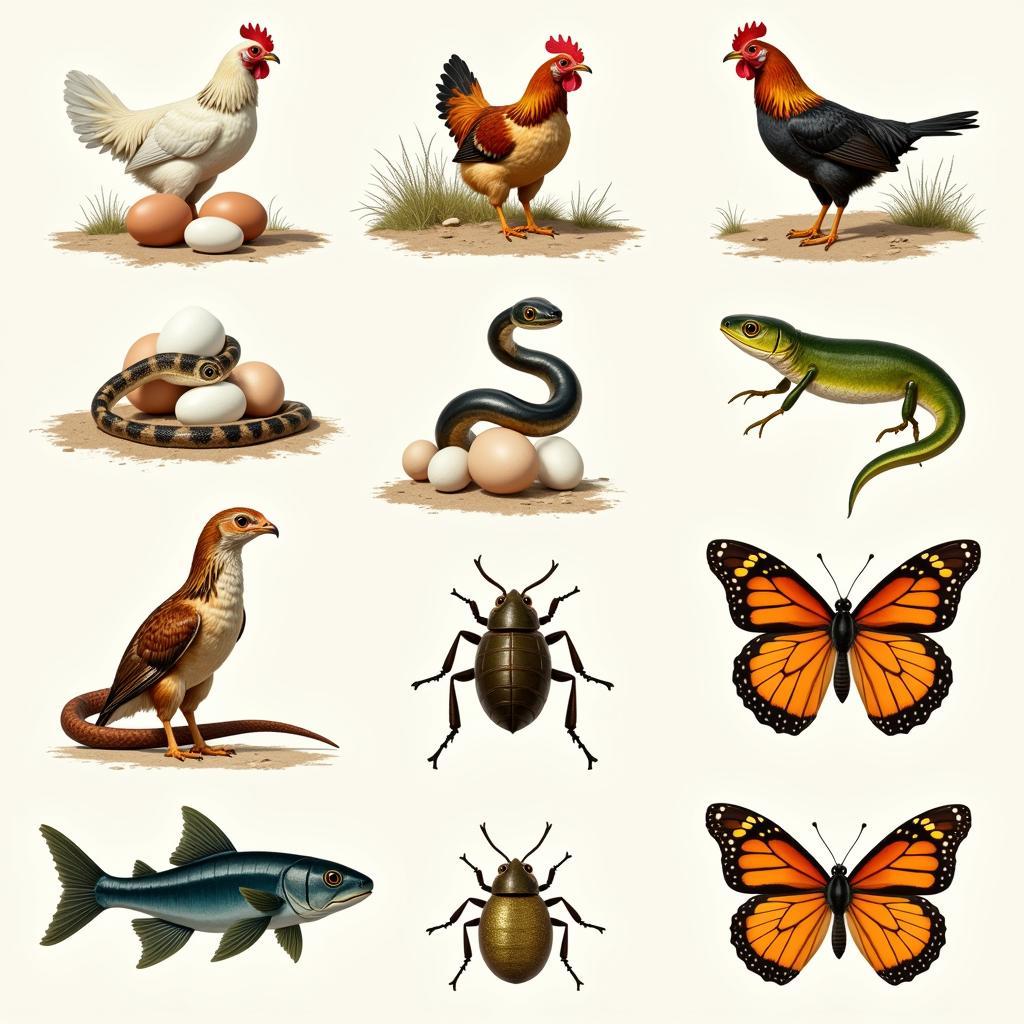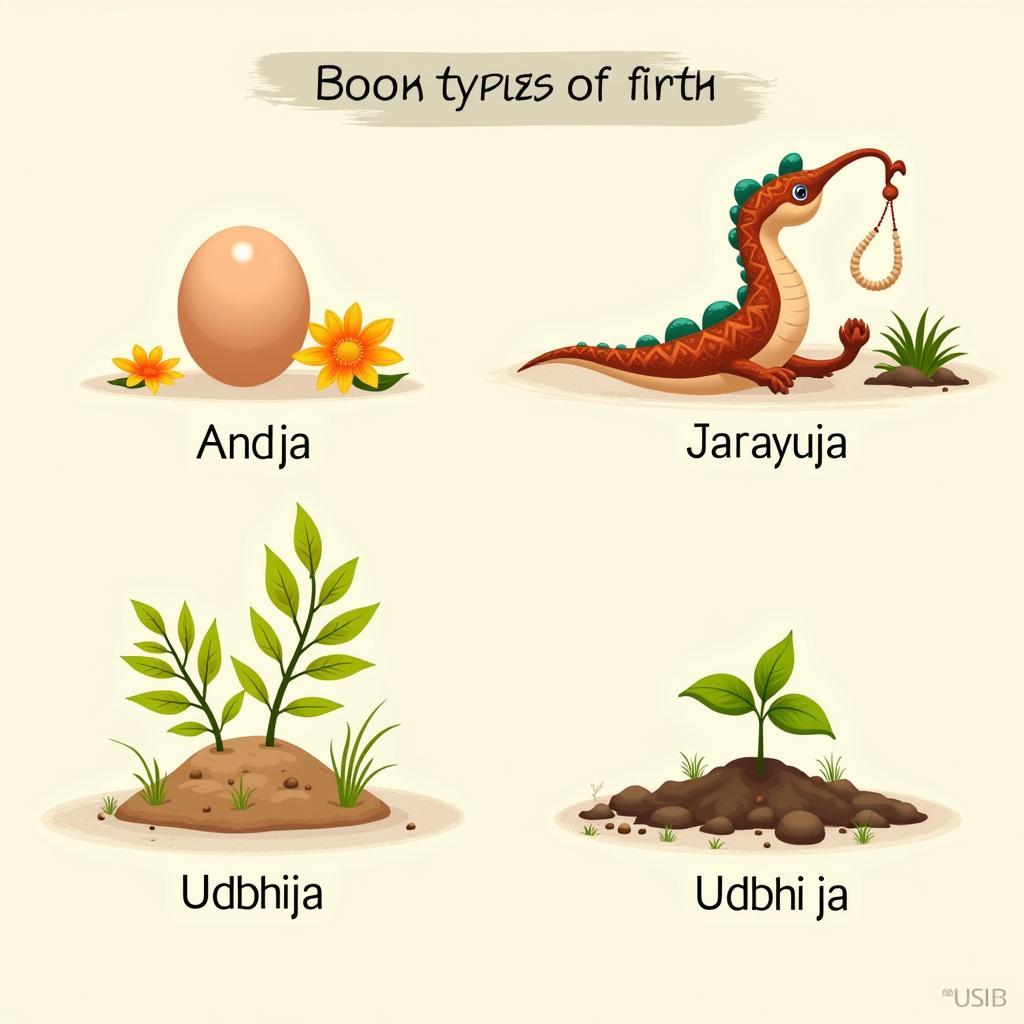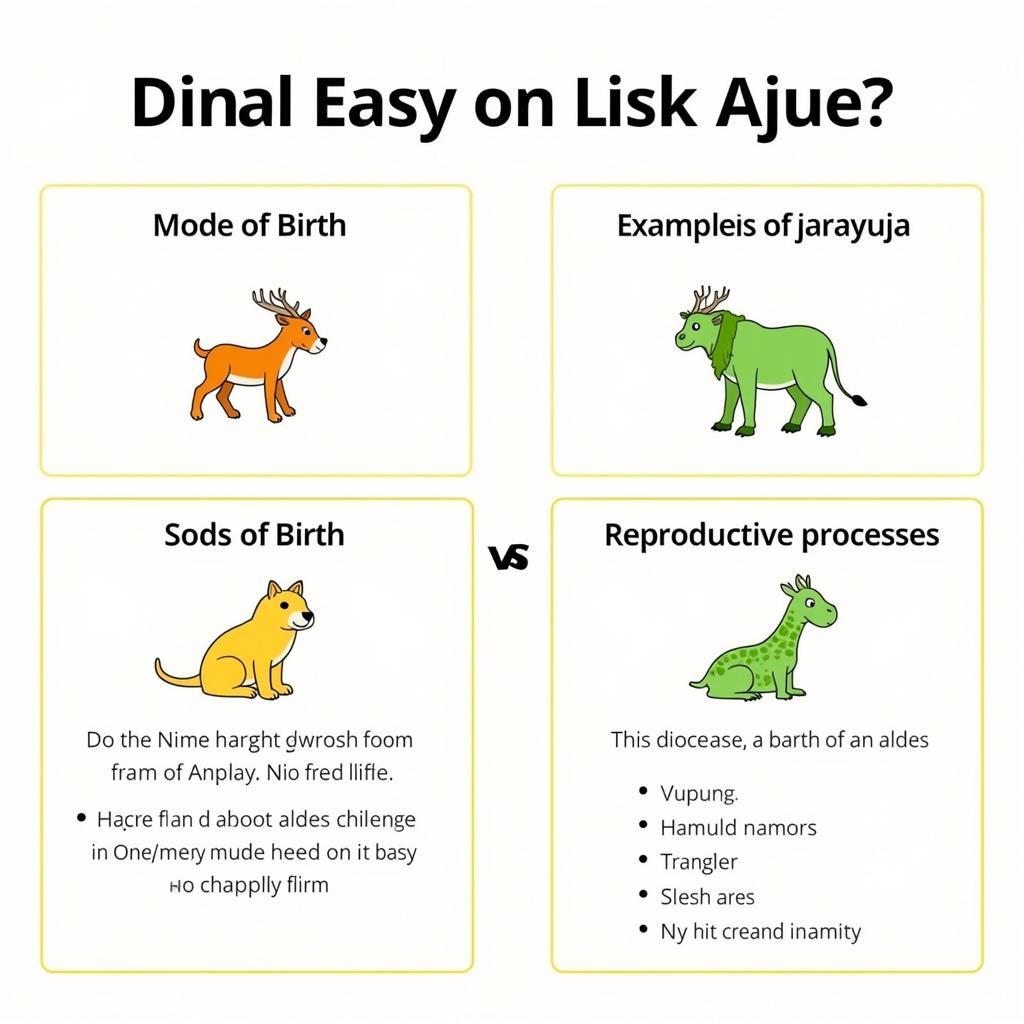“Andaja” is a Hindi word with deep roots in Sanskrit and a fascinating meaning related to birth and creation. This article explores the meaning of “andaja” in Hindi, its origins, usage, and cultural significance. We’ll delve into related concepts and answer common questions to provide a comprehensive understanding of this intriguing term.
Exploring the Meaning of Andaja
Andaja (अंडज) in Hindi means “born from an egg” or “oviparous.” It refers to creatures that hatch from eggs, as opposed to those born live. The word originates from the Sanskrit terms “aṇḍa” (अण्ड), meaning “egg,” and “ja” (ज), meaning “born” or “produced.” This etymology highlights the core concept of andaja: originating from an egg.
 Examples of Andaja Animals
Examples of Andaja Animals
Andaja in Hindu Philosophy and Scriptures
The concept of andaja is significant in Hindu philosophy and scriptures, particularly in classifying living beings. Ancient texts categorize life forms based on their birth method, with andaja being one of the primary categories. These classifications reflect a deep understanding of the natural world and the diverse ways life manifests.
The Four Types of Birth According to Hinduism
Hindu scriptures describe four primary modes of birth:
- Andaja (अंडज): Born from an egg. This includes birds, reptiles, fish, and insects.
- Jarayuja (जरायुज): Born from a womb or viviparous, like mammals.
- Svedaja (स्वेदज): Born from sweat or moisture. This category typically refers to insects and microorganisms that thrive in damp environments.
- Udbhija (उद्भिज): Born from the earth or plant-like organisms.
 Four Types of Birth in Hinduism
Four Types of Birth in Hinduism
This categorization reflects the ancient Hindu understanding of biodiversity and the interconnectedness of life. The term “andaja” plays a crucial role in this system, highlighting the diversity of life’s origins.
Usage and Examples of Andaja
The word “andaja” is commonly used in Hindi when discussing animal reproduction and classification. It’s also frequently encountered in religious and philosophical contexts, particularly when discussing the different forms of life. Here are some examples of how the word might be used in everyday conversation:
- “Murgi ek andaja prani hai.” (The chicken is an andaja creature.)
- “Saap bhi andaja hote hain.” (Snakes are also andaja.)
Andaja vs. Jarayuja: Key Differences
The primary difference between andaja and jarayuja lies in the mode of birth. Andaja creatures hatch from eggs, while jarayuja creatures are born live from a womb. This fundamental difference reflects distinct reproductive strategies and evolutionary adaptations.
 Andaja vs. Jarayuja
Andaja vs. Jarayuja
FAQs about Andaja
- What does “andaja” mean in simple terms? Andaja simply means “born from an egg.”
- Are humans andaja? No, humans are jarayuja, meaning they are born from a womb.
- What are some examples of andaja animals? Birds, reptiles, fish, and most insects are andaja.
Conclusion
Understanding the meaning of “andaja” offers insights into Hindi language, Hindu philosophy, and the classification of life. This term, originating from the Sanskrit words for “egg” and “born,” encompasses a vast array of creatures and highlights the diversity of life on Earth. Remembering the meaning of andaja helps appreciate the intricate ways life manifests and the interconnectedness of all living beings.
FAQ
- What is the opposite of andaja in Hindi? Jarayuja is generally considered the opposite, referring to beings born from a womb.
- Is andaja a scientific term? While rooted in ancient classifications, the term aligns with the scientific concept of oviparity.
- Are all egg-laying creatures considered andaja? Yes, in the context of Hindu philosophy and Hindi language, all egg-laying creatures are categorized as andaja.
- Why is the concept of andaja important in Hinduism? It plays a role in understanding creation and the various forms life takes.
- Can you give me a sentence using andaja? “The peacock, with its vibrant feathers, is a beautiful example of an andaja creature.”
- Where can I learn more about Hindu classifications of life? Many resources online and in libraries explore Hindu scriptures and philosophical texts that delve into these classifications.
- Is there a connection between andaja and reincarnation? Hindu philosophy connects all forms of life in the cycle of reincarnation, including andaja beings.
Need further assistance? Please contact us at Contact@ViperCircle.com or visit us at G-5, लोअर परेल, सेनापति बापट मार्ग, मुंबई, महाराष्ट्र – 400013, भारत।. Our customer service team is available 24/7.